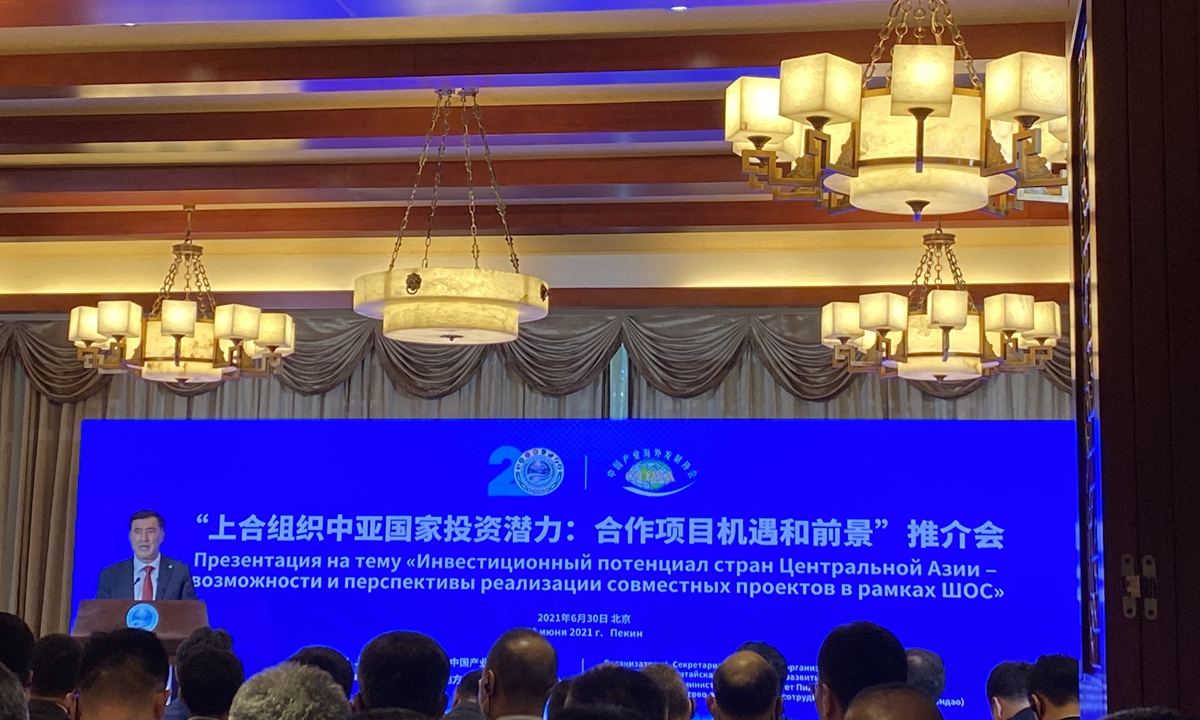
Secretary-General of the Shanghai Cooperation Organization Vladimir Imamovich Norov speaks at an event in Beijing on Wednesday. Photo: Zhang Dan/GT
Four Central Asian countries which are also members of the Shanghai Cooperation Organization (SCO), presented their local advantages to big Chinese companies at an event in Beijing on Wednesday, aiming to attract more Chinese investment at a time when geopolitics and the coronavirus pandemic have disrupted global economic recovery.
Over the past two decades, the SCO has played a crucial role in maintaining regional peace and stability. This influence has now extended into the trade and investment arena.
Diplomats from the embassies of Uzbekistan, Tajikistan, Kazakhstan and Kyrgyzstan in Beijing showcased the advantages of their local industrial parks and competitive industries at the event, which was organized by the SCO and the China Overseas Development Association.
Large Chinese companies from the energy, transport, infrastructure and medical sectors, and internet giants Alibaba and JD.com, attended the event.
"The establishment of the SCO aims to safeguard the stability and security of Central Asia. Now, it also aims to create favorable conditions for the region's prosperity," Secretary-General of the Shanghai Cooperation Organization Vladimir Imamovich Norov said at the event, noting that investment cooperation has become a significant agenda within the SCO.
Compared with other regions, countries in Central Asia boast a great number of young workers and a favorable location, as the region sits at the crossroads of Europe and Asia, Norov said.
"But without stability and security, there won't be economic development," he pointed out. Acknowledging that the world's security and stability are facing new threats, he stressed that Central Asia has a strategically significant role and its stability matters to major powers, such as China and Russia.
This year marks the 20th anniversary of the establishment of the SCO, whose member states account for 22.5 percent of global GDP with overall foreign trade volume surpassing $6.3 trillion.
Clean energy projects will be popular among Chinese investors in Central Asia in the coming years, He Zhenwei, head of the China Overseas Development Association, told the Global Times at the event.
Dismissing claims that China has transferred outdated capacity to developing countries, He said that Chinese companies pay attention to local environmental protection when investing overseas. "Take the 56 Chinese investment projects in Kazakhstan as an example. Equipment delivered by Chinese companies is all new and advanced," He noted.
As the SCO has achieved significant results in its campaign to crush terrorists' movements in Central Asia, economic cooperation has been inevitably put on the agenda of the organization, Wang Yiwei, director of the Institute of International Affairs at Renmin University of China in Beijing, told the Global Times on Wednesday.
"Demand for economic development is very strong because the regional economy is still mired in the fallout of the COVID-19 pandemic, and the SCO, as well as China's Belt and Road Initiative, is providing an extra incentive to strive for economic cooperation," Wang said.
But economic cooperation among SCO member states also faces unprecedented challenges, as the organization grows bigger and more sophisticated.
According to Wang, geopolitical and cultural issues among SCO members are becoming increasingly complicated.
"The mainstream culture within the bloc was backed by Russia and China when it started, but with countries with conflicting interests such as India and Pakistan, open dialogue and communication will be central for future cooperation," he said.
In terms of economic relationships between China and Central Asian countries, Wang said that the biggest obstacle for development is the lack of incentives for Chinese companies.
"There is still room for the business environment to improve in Central Asia, and the industries there are mainly in the energy sector," Wang said. "Even with the China-EU freight trains, most of the positive impact is felt by economies in Europe and China."
Wang suggested that Chinese companies make full use of the proximity of Central Asian countries, and build diverse supply chains there that can cut costs and bring more local opportunities.
"Chinese companies can utilize their experience in the digital economy to transform the nation's trade relationship with Central Asia from commodity-based to service-based," Wang said.




